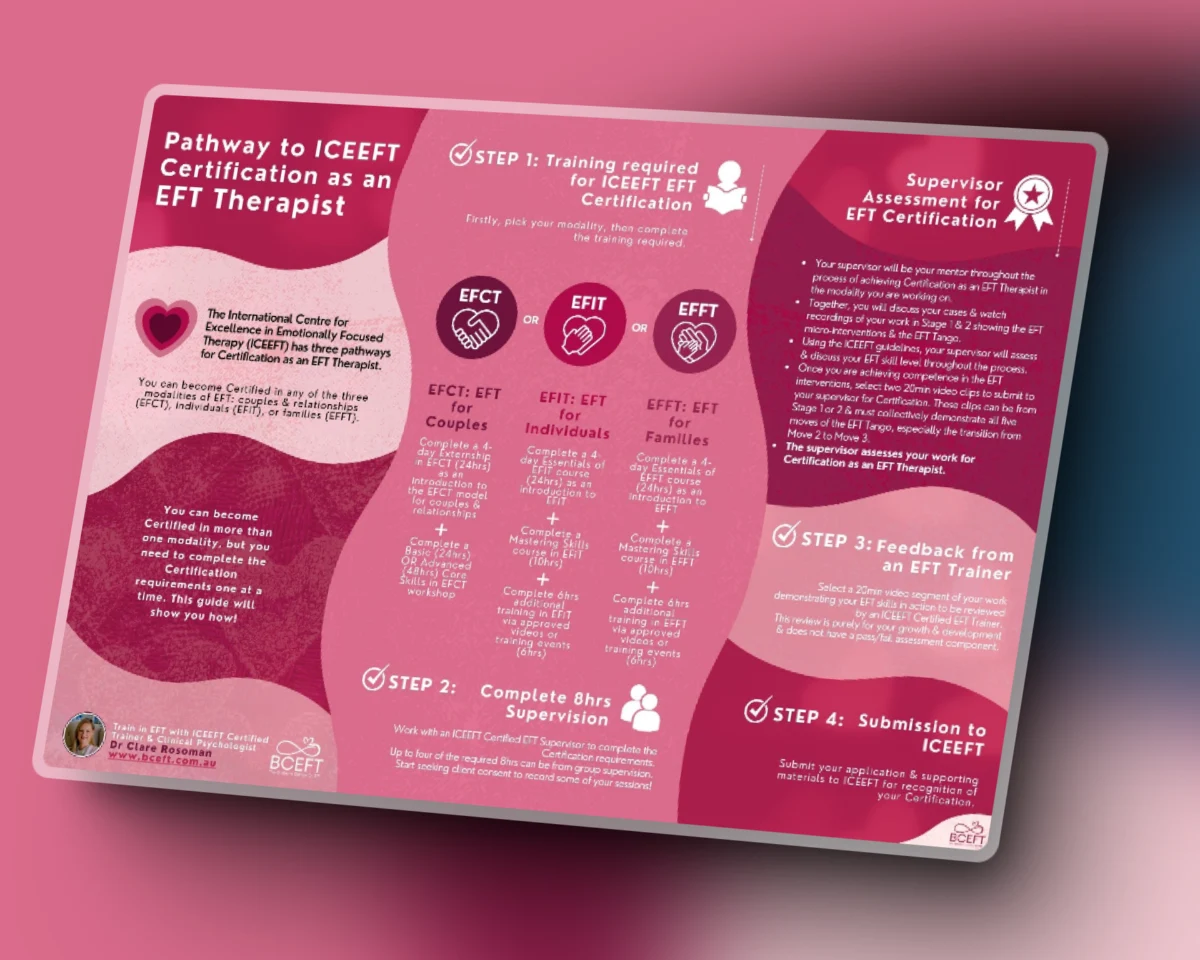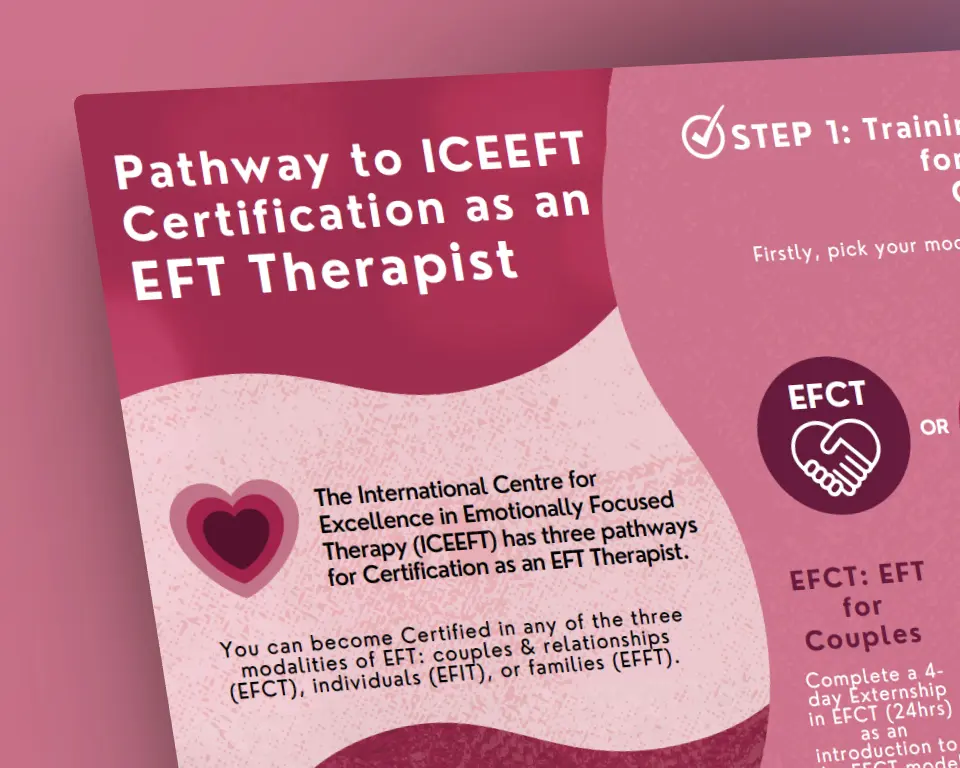ICEEFT Certification as an EFT Therapist
EFT has grown exponentially around the world. What began as a couple therapy is now widely used for individuals (EFIT) and families (EFFT). The International Centre for Excellence in Emotionally Focused Therapy (ICEEFT) has expanded the scope of EFT Certification for therapists to include EFIT and EFFT designations.
There are three pathways to ICEEFT Certification. Therapists can become Certified in EFT for couples and relationships (EFCT), EFT for individuals (EFIT), or EFT for families (EFFT). Therapists can complete any or all of the following certifications:
- ICEEFT Certified Emotionally Focused Couples Therapist
- ICEEFT Certified Emotionally Focused Individual Therapist
- ICEEFT Certified Emotionally Focused Family Therapist
The certification process includes criteria that must be met in order for a therapist to receive EFT certification. This is based on both observational processes of effective EFT therapy and written requirements.
Essentials of EFIT
Four days of training in EFIT (24 hours)
EFIT Mastering Skills
Cosultation course in EFIT (10 hours)
Additional training
Approved EFIT training videos/courses (6 hours)
8 hours supervision
With an ICEEFT Certified EFT Supervisor
Externship in EFCT
Four days of training in EFCT (24 hours)
Standard OR Extended Core Skills in EFCT
24hr format or 48hr format
8 hours supervision
With an ICEEFT Certified EFT Supervisor
Essentials of EFFT
Four days of training in EFFT (24 hours)
EFFT Mastering Skills
Consultation course in EFFT (10 hours)
Additional training
Approved EFFT training videos/courses (6 hours)
8 hours supervision
With an ICEEFT Certified EFT Supervisor
EFT Therapist Certification Process
For those therapists wanting to become Certified EFT therapists in their chosen modality, ICEEFT has a well mapped-out process to follow.
Step 1
Complete required training in EFT modality of your choice (EFCT, EFIT, EFFT)
You can become a Certified EFCT Therapist, EFIT Therapist, or EFFT Therapist depending on which training track you complete. It is possible to certify in more than one track, but you need to complete the Certification requirements for each track, one at a time.
Step 2
Complete 8hrs of supervision with an ICEEFT Certified EFT Supervisor & submit two 20min video segments
You & your supervisor discuss your cases & watch recordings of your work showing the EFT micro-interventions & the EFT Tango. Using ICEEFT guidelines, your supervisor will assess & discuss your EFT skill level throughout the process.
Once you are achieving competence in the EFT interventions, select two 20min video clips to be submitted to your supervisor for Certification. These clips can be from Stage 1 or 2 & must collectively demonstrate all five moves of the EFT Tango, especially the transition from Move 2 to Move 3.
The supervisor assesses your work for Certification as an EFT Therapist.
Step 3
Show 20min video of your work to an ICEEFT Certified EFT Trainer
Along with your supervisor, select a 20min video segment of your work that demonstrates your EFT skills in action to be reviewed for feedback by an ICEEFT Certified EFT Trainer of your choice. This can be a Stage 1 or 2 clip & does not have to show all five moves of the EFT Tango.
The review of your work by a Certified EFT Trainer is purely for your growth & development & does not have a pass/fail assessment component.
Step 4
Submit application & supporting materials to ICEEFT for Certification
As verified by your supervisor, you must be a member of ICEEFT & have completed the training, reading & supervision requirements for Certification. You must be a registered mental health professional in your region with current malpractice insurance & recent, relevant therapy experience.
Checklist for Certification Submission
To be completed by the applicant and confirmed by the Supervisor
NOTE: Specific details and information are available on iceeft.com and this is offered as a general checklist for certification applicants.
General requirements
- Cover letter and CV
- Letters of reference from 3 colleagues
- Current relevant clinical therapy practice
- Licensed or registered to practice psychotherapy in your state/province/region
- Graduate degree
- Proof of malpractice insurance
- Membership in ICEEFT
Proof EFT
of training
- Completion of all required ICEEFT core trainings in the chosen modality (EFCT, EFIT, or EFFT).
- Completion of any further certification training requirements, e.g., completion of the reading of specified books, watching of videos of approved additional
trainings (for EFIT and EFFT). - Completion of supervision requirements (8hrs in the chosen modality).
Video Submissions
- Submission to Supervisor of two therapy session video segments that demonstrate competence in EFT.
- A case summary of the client(s) in the video segments.
- Submission of one therapy session video segment and case conceptualisation to a Trainer for review and receiving of feedback.
- Submission of application to ICEEFT (as outlined on the members’ website), as well as the $600 CAD fee.
Download the certification infographic

This handy 1 page guide aims to answer all your questions about certification as an EFT Therapist.

Frequently Asked Questions
When do my supervision hours start counting towards Certification?
So long as your supervisor is an ICEEFT Certified EFT Supervisor or Supervisor Candidate, you can start counting your supervision hours towards the eight needed once you have attended Externship in EFCT or Essentials in EFIT/EFFT.
Can some of the eight hours be made up of group supervision?
Yes, so long as your group supervisor is an ICEEFT Certified EFT Supervisor or Supervisor Candidate, you can count up to four of the eight required hours from group supervision. If you have supervision in a pair, this can be counted as individual supervision.
What skills do I need to develop for EFT Certification?
Learning and integrating the EFT model includes development of the following skills. This list can
be used as a guideline to assist supervisors and applicants to assess for readiness for certification.
Additional specific details and information for each EFT modality (EFIT, EFCT & EFFT) are available
on the ICEEFT members website whereas this document is offered as a generic overview.
Alliance Skills
Therapist readily demonstrates…
- Attunement and empathic tracking of client’s experience.
- A safe-haven alliance (A.R.E.) including assessing risk, context, and contraindications.
- Focus on reactive patterns and validate client’s attachment strategies.
- Effectively engage with clients in all their diversity, including the negative impact of discrimination
along with clients’ strengths and resilience.
Micro Skills
Therapist shows ability to…
- Reflect and validate client’s experience and identifies emotions and relational patterns.
- Validates vulnerabilities and coping strategies normalizing blocks.
- Asks evocative questions that help identify patterns, and elicit deeper emotions, underlying
attachment fears, and longings. - Asks open-ended questions and encourages self-reflection.
- Makes appropriate empathic conjectures that validate and deepen experience (e.g. self/other)
- Uses all micro skills together with RISSSSC prosody – slow, specific, soft, etc.
- Heightens experience with images and client’s emotional handles, where appropriate.
- Reframes experience – mostly in terms of attachment-related emotions.
- Evokes emotional experience and choreographs engaged encounters/enactments.
- Paces risk-taking holding client within the leading edge (e.g. window of tolerance).
Tango Skills
Therapist shows ability to…
- Move 1: Identify relational patterns and affect regulation processes leading to self-perpetuating
cycles. - Move 2: Assemble Emotion – Pinpoints trigger, perception, body sensation, meaning and action by
focusing on and processing core emotions. - Move 2: Distills emotion with RISSSSC and engages present experience in highly focused manner.
- Move 3: Sets up encounters/enactments that prompt new awareness and /or bonding experience.
- Move 4: Processes encounters (Move 3) with client(s).
- Move 5: Summarizes progress in the session, validating growth, contrasting new interactions and highlighting corrective emotional experience.
What do I need to show in my video submissions?
Applicants are asked to provide a minimum of two 20min therapy excerpts. The emphasis for certification is the therapist’s use of the EFT Tango to process emotion and create moments secure connection between partners or family members (in EFCT and EFFT) or with more vulnerable parts of self (in EFIT).
The excerpts are to be a minimum total of 20 minutes each. If you want the supervisor to review certain segments of the same session, please submit the entire session and indicate the minute times of the excerpts to be reviewed.
Excerpts are to be video sessions. Zoom sessions are acceptable. Audio sessions are not acceptable.
A case conceptualization for each client in the video excerpt(s) is to be submitted and should include a summary of presenting problem, attachment history, cycle, case progress to date, and therapist self-reflections.
